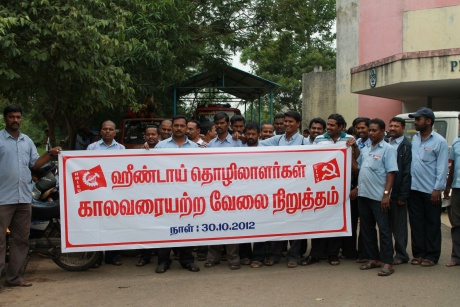What UAW has proven is that it wants one union only in any workplace, or company at large, or in a trade nationwide. It doesn't want sharing and dialoguing with other unions based on the ultimate values for the workplace that alternative unions may have to offer. In the USA, the Christian Labor Association has represented an alternative philosophy of labor relations to that of Big Unionism. It has represented the freedom of association option, but it must work withing a system that awards representation only to the winner of 51% of the workers to voting, 50% + 1 of the workers in a winner-takes-all system of voting for labour representation. There is no freedom of association in this system, and perhaps Nissan knows that. However, I doubt that Nissan knows anything about workers' freedom of association, because in Japan I don't see any evidence of it. Japan's industrial relations system was set up after World War II, while the USA occupation forces were still in control. Many phoney ideas from the USA were sponsored in many countries, often financed by the CIA with money funneled to the AFL and CIO to spread anti-freedom-of-association philosophies of unionization to previously totaliarian countries where workers were used to being herded about by one overlord or another. In labour relations, it' all to easy to become beguiled away from real freedom of association and the pluralization of workers representation. Even the CLA seems to lack the vision of its principles. Consider the location of Nissan's manufacturing facility in Mississippi, an area where the density of Christians in the population is very high. Why can't CLAC venture forth to teach the Christians in the workplaces of companies like Nissan that our faith gives us a better way to pursue positive industrial relations, involving freedom of association and pluralization of workers representation, that woud lead to better results from the Nissan company, whereby the management too coud learn to relate better to workers in all aspects of work and production of automobiles. You have not because you ask not.
Here's what CLA-USA says: "The CLA works to promote harmony between Employer and Employee. This makes us a unique organization. The CLA is a labor union, certified by the National Labor Relations Board and similar state and local agencies. Our right to act as bargaining agents for employees is protected by law. The CLA is not affiliated with a large international union, but democratically governed by its membership. The CLA promotes harmony among all workers. Our method of operation allows for the crossing of trade lines, eliminating craft disputes. The CLA realizes that the livelihood of the employer and employee is derived from the same source."
Michigan Office – National Headquarters
PO Box 65
405 Centerstone Court
Zeeland, Michigan 49464
405 Centerstone Court
Zeeland, Michigan 49464
Contacts:
Clarence Merrill
National Representative
National President
Clarence Merrill
National Representative
National President
Jennifer Keegstra – Office Administrator
Phone: (616) 772-9164
Toll Free: 877-CLA-1018
FAX: (616) 772-9830
Toll Free: 877-CLA-1018
FAX: (616) 772-9830
Email: michigan@cla-usa.com
-- Albert Gedraitis
IndustriALL (Dec1,2k12)
US Nissan workers seek fair union election
26.11.2012
Launched at the LabourStart conference in Sydney on 26 November, 3,000 workers at Nissan’s assembly plant in Canton, Mississippi, USA are campaigning for a fair union election and an end to Nissan’s fear and intimidation tactics.
Management at Nissan’s plant in Mississippi is running an aggressive and sophisticated anti-union campaign against its employees who are forming a union to achieve a voice in the workplace. Nissan is denying these workers a fair, democratic election, and management has sent a clear message to the workforce that considering a union could cost them their job.
Supported by workers, students, community leaders and human rights activists around the world, the UAW’s LabourStart campaign (http://www.labourstart.org/nissan) calls on Nissan’s Chief Operating Officer, Mr. Toshiyuki Shiga, intervene to make things right in Mississippi.
Speaking at the LabourStart conference, Jeffrey Moore, one of the Mississippi autoworkers said, “Nissan workers are seeking union representation because they want fairness and a chance to be heard. They are seeking a voice on the job just like their colleagues in Japan and elsewhere.”
For years, Nissan workers in Mississippi have strived for fairness and believe that creating a union is the best, most effective way to work with management to solve problems in the plant. The workers are seeking membership and representation by UAW in discussions with management on:
- safety problems and work-related injuries
- the use of labor agencies to recruit, and hire on lower wages and with no path to direct employment.
- respect from managers in the workplace
- fairness in the disciplinary process
- decisions about work process and product improvement
- equality of wages, policies and benefits between Nissan workers at a sister plant in Tennessee and those in Mississippi
Canton workers also want to help improve the overall rights and working condition of workers in the state of Mississippi.
“At Canton Mississippi, Nissan management is making propaganda against the UAW and intimidating workers depriving them from a free choice. This is an unacceptable and against freedom of association,” said Jyrki Raina, General Secretary of IndustriALL Global Union in support of the workers’ campaign.
“UAW has offered Nissan a positive, collaborative approach, but the US management is refusing partnership despite the fact that most of Nissans operations in countries such as Mexico, Spain, UK, Russia, Japan, Australia, South Africa and Thailand are unionized and enjoy constructive labour and management relations,” said Raina.



